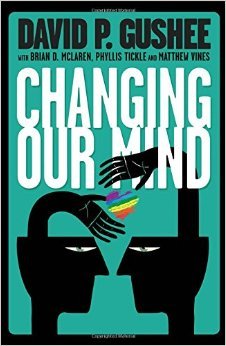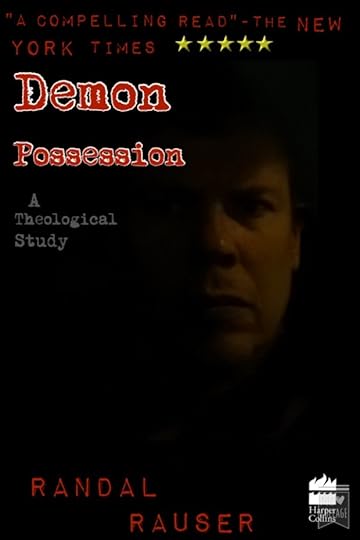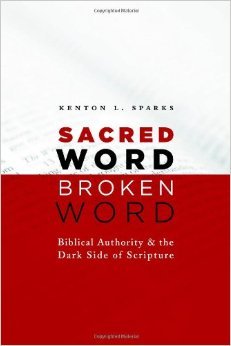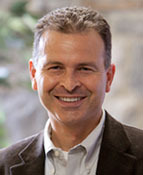Randal Rauser's Blog, page 165
December 6, 2015
Jerry Falwell Jr: Jesus follower … or hate monger?
As the saying goes, the apple doesn’t fall far from the tree. It turns out that the intolerant spirit of Jerry Falwell (d. 2007) lives on in his son, Jerry Jr., who also happens to be the President of Liberty University, the school his father founded. (University presidencies that pass from father to son? Is this a university or a hereditary fiefdom?)
On this past Friday at the Liberty University convocation, President Falwell responded to the recent shootings at the hands of Muslim extremists with a call for students to carry guns to campus. (See the Slate article “Falwell Calls on Students to Carry Concealed Guns to Help ‘End Those Muslims‘”.) He also mocked calls for gun control and alluded to the fact that he was himself packing heat even as he addressed the 10,000 students. And the reason Falwell wants more students to carry guns? “Let’s teach them a lesson if they ever show up here,” he barked to the roaring approval of the crowd. He then added:
“I’ve always thought if more good people had concealed carry permits, then we could end those Muslims before they walked in.”
Falwell later on specified that he was advocating the killing of Muslim terrorists only, not Muslims generally. (Whew, thanks for clearing that up.)
But it’s hard to put into words how irresponsible, deplorable, despicable, and hate-mongering that language is. And from a “president”? The mind boggles.
If I were a faculty member of Liberty University, I’m afraid I would feel morally obliged to take a visible stand against this ignoramus. And I hope the faculty have the wisdom and courage of conviction to do precisely that.
In the interim, let’s consider just how disgusting that buffoon’s words were by putting his sentiments into another context. Just over a week ago, a “Christian” extremist walked into a Planned Parenthood clinic and began shooting. As the smoke cleared, three were dead and nine injured.
Now imagine if the President of the American Atheists were speaking at their annual convention. And during his speech he encouraged all the atheists gathered to carry guns so they could teach Christians “a lesson”. As the crowd cheers, he barks out:
“I’ve always thought if more good people had concealed carry permits, then we could end those Christians before they walked in.”
Would Falwell be happy with that? One suspects not.
December 3, 2015
The irrational fear of Islam, or why “radical Islam” is like the Ebola virus
With the most recent terroristic act in San Bernardino at the hand of Muslim Syed Farook and his wife, one can anticipate the fear and paranoia about “radical Islam” will continue to grow. To be sure, like any other radicalized ideology, radical Islam is a reality against which one must be vigilant. However, I worry that the fear and paranoia that is produced by evil actions such as the San Bernardino massacre is out of proportion to the perceived threat.
How so?
Remember just over one year ago when North America — and indeed, much of the western world — was gripped by a fear of the Ebola virus. Okay, “gripped by a fear” may be an overstatement, but not by much, I suspect. There was a lot of fear at the time. To note one example, there was the case of the Maine nurse, Kaci Hickox, who returned to the United States after fighting Ebola in west Africa. Though she showed no signs of ill health, the government attempted to place Hickox under quarantine. And she was hounded by reporters when she dared to leave her house for a quick jog. Now that’s paranoid.
To be sure, Ebola is a very serious disease, and the world discovered that an outbreak needs to be treated with great care and vigilance. Nonetheless, the fear of Ebola in North America was all out of proportion to the threat.
So see what a more palpable threat looks like, consider the annual impact of the lowly seasonal flu. According to Canada’s chief public health officer reported that within Canada 2000-8000 people die every year from the seasonal flu and its complications. (source) Granted, this is a guesstimate as nobody really knows what the numbers are. However, a guesstimate is sufficient for our purposes.
As for the United States, according to the CDC:
“It is estimated that between 5% and 20% of U.S. residents get the flu, and it is estimated that more than 200,000 people are hospitalized) on average for flu-related complications each year. Over a period of 30 years, between 1976 and 2006, estimates of flu-associated deaths in the United States range from a low of about 3,000 to a high of about 49,000 people.” (source)
With thousands dying every year and tens of thousands hospitalized, the seasonal flu is a far more serious public health threat in North America than Ebola has ever been. Suffice it to say, North Americans who opted not to get the seasonal flu vaccine whilst obsessing about a Maine nurse who showed no symptoms of Ebola were engaging in a completely irrational assessment of perceived threat.
If “radical Islam” is the current paranoid equivalent of Ebola virus, gun violence simpliciter is the equivalent of the seasonal flu virus. On average, there is at least one mass shooting in the United States every day. According to an outstanding essay in Mother Jones titled “The True Cost of Gun Violence in America”, there were more than 10,000 gun-related homicides and assaults in 2012.
To focus on radical Islam rather than the unmitigated plague of gun violence simpliciter (as so many are wont to do) is precisely as irrational as obsessing about Ebola rather than the devastating seasonal flu.
November 30, 2015
Should a Christian support Donald Trump for President? Of course not. Can they? I don’t think so.
Donald Trump raised eyebrows today with his statement that several black pastors were supporting his candidacy for the Republican nomination to run for president. It turns out that those pastors were not in fact endorsing Trump. They were just meeting with him.
The eyebrow raising seems to have been largely directed at the fact that black pastors in particular might support Trump. My issue is a little different. How could any Christian pastor support Donald Trump?
I can see a case for Christians supporting Ted Cruz and I can see a case for Christians supporting Bernie Sanders. And I can see a case for Christians supporting most of the wannabe presidential candidates in between.
Trump is different. His racism, xenophobia, sexism, vulgarity, and conceit are legendary. And like the peeling away of an onion, once you peel away that racism, xenophobia, sexism, vulgarity, and conceit, there’s nothing left … except the equally legendary hair, of course.
Donald Trump is nothing less than a walking id with orange hair. However, the id is to be restrained in polite society. And hair alone is not an adequate basis to support someone for president.
In short, the only reason I can see a person supporting Donald Trump is because of personal vice: i.e. they resonate to some degree with his racism, xenophobia, sexism, vulgarity and/or conceit.
While I think Christians should generally be very careful about making declarations that it is simply unchristian to support a political candidate, in Trump’s case that judgment is surely warranted.
So while it is certainly possible that a Christian might support Donald Trump for president, their basis for doing so would, in my view, be fundamentally at odds with their professed Christian convictions.
The Church, homosexuality, and the role of personal experience
What role does experience play in doctrinal formulation? Perhaps more importantly, what role should experience play in doctrinal formulation?
 Those questions were provocatively raised in Atlanta on Friday, November 20th during the annual “Word Made Fresh” lecture at the American Academy of Religion. The lecturer this year was respected evangelical ethicist David Gushee as he shared his own journey toward full acceptance of gay Christians. Gushee published his change of mind on this issue in the appropriately titled 2014 book Changing Our Mind: My Journey as a Christian Ethicist Toward Full LGBT Acceptance (Mercer University Press).
Those questions were provocatively raised in Atlanta on Friday, November 20th during the annual “Word Made Fresh” lecture at the American Academy of Religion. The lecturer this year was respected evangelical ethicist David Gushee as he shared his own journey toward full acceptance of gay Christians. Gushee published his change of mind on this issue in the appropriately titled 2014 book Changing Our Mind: My Journey as a Christian Ethicist Toward Full LGBT Acceptance (Mercer University Press).
Exegetical and theological considerations were not insignificant in Gushee’s change of mind. But it is clear from his presentation (I have yet to read his book) that the primary catalyst for his change of perspective came through hearing the stories of homosexual people. In this regard, Gushee’s presentation reminded me of the shift of Lewis Smedes some twenty years ago which he recounted in the essay “Like the Wideness of the Sea.”
Gushee’s presentation was structured around narrative, in particular his own journey in learning to hear the pain and struggle of gay Christians … as well as the horrific treatment that gays have often received at the hands of the Christian community.
For example, Gushee recounted speaking at an event in California on this topic. Afterward a father and son came up to him to thank him for his talk. Then the father recounted that the son’s friend had committed suicide after he revealed his homosexuality to his parents and they angrily rejected him. The father then observed that the parents refused to claim the young man’s body at the morgue, and so this father and his son had claimed the body and paid for the funeral.
What an incredibly painful (and perfectly horrible) story. How many people have been similarly burnt by the extraordinary ungrace that Christians often show to the world around them?
The second appendix of the handout that Gushee provided with the talk included more than twenty short excerpts from LGBT people and their supporters expressing anger, disappointment, and disillusionment with the Christian community. Consider, for example, this passage:
“One elderly couple, whom the pastor had not realized were a couple, were told they could no longer participate in the many things that they had once led in at that church. Except they didn’t have anyone else who could direct the choir. And so B. was told to continue to direct the choir but could no longer turn to face the congregation when up front.”
Absurd, right? But such things do happen in church, and they cripple the church’s witness to the world as a result. (That story in particular reminds me of the 2014 movie “Love is Strange.”)
Many of the comments on the handout commend Gushee’s stance as a bold and loving affirmation of people long marginalized on the edge of Christian community. Among them is this one:
“I’ve been reading about your new book in tears. Good tears. I have spent my years in college through now painfully ‘in the closet.’ I’ve only this past year come to hope/plan a way out.”
And then there is this reflection from a mother:
“I am the Christian mother of a gay son. God has taken us on such a journey. I just can’t tell you how my life has been changed for the better with my acceptance of our son. I felt like for far too long I needed permission to love my own child. Our son has been so hurt that I’m not sure where he stands with Christ currently. Breaks my heart that people felt they had the right to say who can and can’t be loved by God.”
For a Christian, exegesis of biblical texts is a crucial building block in doctrinal formulation. But it isn’t the only building block. For example, rational and moral intuitions are also important. (These intuitions shape, for example, the way one articulates divine attributes like eternity, impassibility, and perfect goodness.) Tradition is also important. (Is it any surprise that a Baptist and a Catholic will read scripture differently?) And let us not forget scientific advance. (Who can deny, for example, that earth’s history as described by astrophysicists, geologists and biologists is informative in how one might formulate a doctrine of creation?)
And what of personal experience? What of the experience of David Gushee himself as well as the many personal stories he shares in his talk and in his book? How does one factor in the personal witness of individuals into biblical reading and ethical reflection on a question like homosexuality? Can one draw upon personal narratives? If so, how does one judge which narratives to heed? And what authority should they be granted vis-à-vis exegetical/hermeneutical considerations?
These are hugely important questions. And until Christians begin to find some common ground on the role of personal and communal experience in biblical reading and doctrinal formulation, we will not likely make much advance in finding concord on these contentious issues.
November 28, 2015
Demon Possession: The book I should write someday…
 Yesterday evening while waiting in a darkened car for my daughter, I took a selfie. (Actually, I took four.)
Yesterday evening while waiting in a darkened car for my daughter, I took a selfie. (Actually, I took four.)
Since at least one of them turned out rather well, I tasked my daughter with using it to produce a book cover. Given the dark theme, I suggested the title Demon Possession: A Theological Study.
I must say the result turned out rather well. I especially appreciate the endorsement from The New York Times.
Now that I have the cover all I need to do is write the book itself.
Frankly, I’d really be interested in shadowing a Catholic exorcist for a couple months. Now that would be a fascinating exercise. Unfortunately, Catholic exorcists are highly secretive and regularly decline media requests. So if Demon Possession: A Theological Study is ever to be written, I suspect it will not be under conditions quite so dramatic.
November 26, 2015
On Ape-Men and Grand Illusions
 Last week when I was at a conference in Atlanta I attended a session featuring a dialogue between geneticist Darrel Falk of Biologos (an evangelical organization which promotes theistic evolution) and Nathaniel Jeanson of Answers in Genesis (the premiere young earth creationist organization).
Last week when I was at a conference in Atlanta I attended a session featuring a dialogue between geneticist Darrel Falk of Biologos (an evangelical organization which promotes theistic evolution) and Nathaniel Jeanson of Answers in Genesis (the premiere young earth creationist organization).
It was a significant event insofar as this is one of the first public events in which a representative of Answers in Genesis has agreed to a public dialogue with a theistic evolutionist.
At least it seemed like a dialogue (and Falk described it as such). However, Jeanson stated that he viewed the exchange as a “debate” rather than a dialogue, not least because he believed one’s view of Genesis was “close” to being a “cardinal doctrine” for Christians (in other words, young earth creationism is dogma, or close to it). Frankly, I found this comment a bit strange. Even if you think a theistic evolutionist cannot be a Christian, what’s wrong with dialoguing with them? Why must it be a debate? Would a friendly dialogue sully one’s integrity somehow?
When I entered the room, a representative of AiG handed me a complimentary copy of the DVD Ape-Men: The Grand Illusion, featuring young earth creationist Terry Mortenson (who I interviewed last year in my podcast). Today I decided to watch the DVD and it was exactly what I expected: an extended indoctrination of an enthusiastic Christian audience into thinking that “evolutionists” only sustain their beliefs by way of deception and mind-boggling ineptitude.
Mortenson begins by describing the evolutionary story with the pithy phrase “The view of goo to you via the zoo.” That’s it. The story of life reduced to goo?zoo?you. As you can imagine, that line elicited a big laugh from the audience.
From there Mortenson presented several examples of the absurd lengths to which “evolutionists” go to prop up their fanciful notions. He noted, for example, that the “missing link” called “Nebraska man” was, in fact, an imaginative creation built around the misidentified tooth from an extinct pig. As Mortenson observed, “This was a case where a pig made a monkey out of a man.” (Another big laugh.)
Mortenson also relished informing his audience that “Piltdown man” was a discredited hoax from the early twentieth century. (Yes folks, two of his significant lines of evidence to discredit evolution are based on examples discredited shortly after WW2, as if nothing much has happened in evolutionary biology since then!).
After noting a few other examples, Mortenson presented the following question:
“How to make an ape-man?”
Mortenson then goes on to list four ways to create an “ape-man”, each of which drew the belly laugh from the audience:
A few human bones + imagination = ape-man.
A few ape (?) bones + imagination = ape-man.
A few ape bones + a few human bones + imagination = ape-man.
Grind or file the ape or human bones + imagination = ape-man.
By this time, half way through the video, I figured I’d had enough. The first forty minutes consisted of a smattering of facts stitched into a light hearted narrative meant to show that Neo-Darwinian evolution was little more than a naïve concoction borne of imaginative conjecture, willed self-delusion, and outright deception.
Mortenson’s approach to the subject matter reminded me of the documentary Merchants of Doubt. This powerful documentary (based on the book of the same name) illustrates how professional spin doctors manipulate public opinion to undermine established professional consensus by spreading misinformation to create the perception that no real consensus exists. The tobacco companies did it for years regarding the health impact of tobacco. More recently the oil companies have been enormously effective in perpetuating doubt when it comes to human induced climate change. And groups like AiG do something similar when they manipulate conservative Christian audiences into believing the scientific consensus on Neo-Darwinian evolution is borne of ignorance, gullibility, and deception.
November 24, 2015
Is it wrong to tell your children about Santa Claus?

Paintings by Haddon Sundblom at the “World of Coca Cola” gallery.
The other day I visited the “World of Coca Cola” museum in Atlanta, GA which (as you can probably guess!) is devoted to the perennially popular beverage and its incalculable impact on popular culture.
The museum includes a gallery featuring the iconic paintings of Haddon Sundblom. Beginning in the 1930s, Sundblom created a series of Christmas images featuring the jolly old elf promoting Coke. Sundblom’s images helped cement the modern conception of Santa Claus as that “jolly old elf” of Clement Moore’s famous poem “A Visit from St. Nicholas”. (However, by the time Sundblom painted, Santa had grown substantially from a diminutive elf to a gargantuan man with an appetite for endless milk, cookies … and Coke.)
As a fan of Santa Claus, I was deflated to see Catholic apologist Matt Fradd’s article “Why I Don’t Lie to my Children About Santa Claus.” Fradd gives three reasons why parents shouldn’t “deceive” their children into believing in St. Nicholas. The core of Fradd’s argument is that telling your children about Santa Claus “constitutes lying, that lying is wrong, and that we therefore should’t do it.”
I disagree with this argument. In response, I will give a scenario that should follow equally under Fradd’s indictment against lying. However, I don’t think this scenario is morally problematic. And that provides a good reason to believe the instance of inculcating Santa Claus belief is also not morally problematic.
So here’s the scenario. Mr. Smith returns from a business trip and is met at the airport by his wife and daughter. Five-year-old Jenny runs to meet her father and asks the predictable question: “Whatcha bring me?!”
Mr. Smith smiles, reaches into his shoulder bag, and pulls out a teddy bear. “This is Teddy,” Mr. Smith says. “He’s kind of nervous around new people though.” Teddy sneaks a peak at Jenny and then quickly looks away. Jenny giggles. And over the next several minutes, Teddy and Jenny are gradually introduced. Along the way, Mr. Smith fills in Teddy’s complicated backstory and how he is delighted finally to have a new and lasting home with Jenny.
Is Jenny just pretending, or does she really believe Teddy is an agent with a complicated backstory and shyness around new people? Jenny’s own behavior seems to provide an answer. A few days after meeting Teddy, Jenny mistakenly leaves him at a friend’s house. She only realizes her mistake after they get home. “Mummy, we need to get Teddy!” she wails. “Don’t worry honey,” her mom replies. “I’ll ask Mrs. Jones to bring him to church tomorrow.” “Noooo!” Jenny wails. “We need to get him now. He doesn’t know anybody there! He’ll be scared!”
Clearly, Jenny is not simply pretending. She really does accept this backstory in some sense. And that brings us back to her father, Mr. Smith. Did he lie to Jenny? Should he instead have said the truth? “Jenny, I purchased this plush toy at the airport. Be sure you do not impute agency to it as it is merely an inert object!”
No, I don’t think so. Mr. Smith did nothing wrong in giving Jenny his delightful story about Teddy. Neither do parents do anything wrong in giving their children a delightful story about Santa Claus.
November 23, 2015
77. Kenton L. Sparks on the Bible as Sacred and Broken Word

 According to historic Christianity, the Bible is the inspired Word of God. But what does it mean to confess the Bible as inspired, as “the Word of God”?
According to historic Christianity, the Bible is the inspired Word of God. But what does it mean to confess the Bible as inspired, as “the Word of God”?
Like many Christians, growing up in the Church I was taught that the various books of the Bible were produced by the Holy Spirit acting in history to inspire certain individuals so that they could become mouthpieces for God, speaking his perfect truth and wisdom into the world.
In 2 Peter 1:20-21 we read, “Above all, you must understand that no prophecy of Scripture came about by the prophet’s own interpretation. For prophecy never had its origin in the will of man, but men spoke from God as they were carried along by the Holy Spirit.” Very often Christians have understood this verse to apply not simply to the prophet, but to the biblical author as well.
Given this picture, it should hardly be a surprise that the revelation which resulted from this process of inspiration would itself be perfect in all subjects it addresses, from doctrine and morals to science and history. Put simply, since God is perfect, his book must be as well.
Alas, one does not need to read far into the Bible before one encounters texts that seem to stand sharply at odds with this simple and reassuring picture. To put it bluntly, the Word we’ve declared perfect, appears to be imperfect, the very Word we’ve deemed sacred, appears to be broken. So what do we do? At first blush, the choices appear stark. We could follow the skeptic in denying that the Bible is a sacred, inspired, perfect Word from God. Or we could retain the convictions of perfection while rejecting the witness of history, science, ethics or theology: in short, the Bible trumps it all.
But is there a third way?

Dr. Kenton Sparks
In this episode of The Tentative Apologist Podcast we sit down with Dr. Kenton L. Sparks to explore the complexities of reading and interpreting God’s sacred Word. Dr. Sparks is presently the Vice President for Enrollment Management and Special Assistant to the President at Eastern University in St. Davids, Pennsylvania where he has worked since 2000.
Dr. Sparks is also a respected biblical scholar and author of such books as God’s Word in Human Words: An Evangelical Appropriation of Critical Biblical Scholarship (Baker Academic, 2008) and Ancient Texts for the Study of the Hebrew Bible (Baker Academic, 2005). In this interview we will focus on Dr. Sparks’ 2012 book Sacred Word, Broken Word: Biblical authority and the dark side of Scripture (Baker).
November 21, 2015
Politicians, fascists, and used car salesmen
In the last two days Donald Trump has “crossed a new line” by endorsing the suggestion of a reporter that the government should begin to compile lists of Muslims living in the United States. Here is a transcript of one of the relevant exchanges courtesy of MSNBC:
NBC: Should there be a database system that tracks Muslims of this country?
TRUMP: There should be a lot of systems, beyond databases. We should have a lot of systems. And today, you can do it. But right now we have to have a border, we have to have strength, we have to have a wall and we cannot let what’s happening to this country happening –
NBC: Is that something your White House would like to do?
TRUMP: I would certainly implement that. Absolutely.
When he was then asked how he would compile this database, Trump responded that “It would be just good management.”
People are right to point out how disturbing Trump’s declarations are and how they are reminiscent of past policies to track minority populations, most infamously the Jews of Nazi Germany.
But there is one important difference. The Nazi tracking of Jews was motivated by an evil, fascist ideology. Trump, by contrast, seems to be driven more by ego than ideology. And the flippant, cavalier wielding of language to suit his own ego-driven interests: truth takes the hind-most.
If one watches the exchanges, one can’t help but get the “used car salesman” vibe.
USED CAR SALESMAN: How’s it going?
YOU: Fine.
USED CAR SALESMAN: She is a beauty. Just had someone looking at her an hour ago. They’re planning to put an offer in. She won’t last long, that’s for sure.
YOU: What’s the mileage?
USED CAR SALESMAN: Low. And she was babied. Her previous owner was a nice old lady. Never winter driven either. To be honest, I’ve never seen this model and year in this kind of condition. In fact [looks warily over his shoulder], I shouldn’t be telling you this, but we’re practically giving this car away. Like I said, she won’t last long.
Donald Trump isn’t a neo-fascist. He’s a used car salesman. Like that salesman, he’ll blab off-the-cuff whatever might work in the moment to get what he wants. One of these baloney artists wants to sell you a car. The other one wants your vote.
So which is worse? The politician driven by his/her commitment to an errant ideology? Or one driven by a complete disregard for truth? Well, if the ideology in question is something as horrible as Nazism, then I’ll definitely choose the baloney artist.
But are these really the only choices?
November 19, 2015
On reading (and singing) the prayers of others
I grew up in the Pentecostal tradition in which we prided ourselves on being “led by the Spirit” to pray extemporaneously (i.e. off the cuff). Consequently, we viewed those “liturgists” who read prayers out of a book as spiritually suspect at best. The idea of reading a prayer, especially a prayer written by somebody else, appeared to us to make as much (or as little) sense as reading somebody else’s love letter to your beloved.
While I am presently a low church Baptist (another tradition generally skeptical of liturgy, if not as dismissive as the Pentecostals), I have come to appreciate the value of liturgy generally and written prayers in particular. To put it bluntly, when I compare a prayer from the Anglican Book of Common Prayer to the typical extemporaneous prayer one is likely to hear in a Pentecostal or Baptist church, the reverence, theological content and orthodoxy, and compact eloquence of the former more than makes up for the lack of context-specific content one is likely to hear in the extemporaneous prayer.
All this brings me to an interesting observation that my friend, theologian Robin Parry made whilst we were in a recent conversation. He noted that the exact same people who react adversely to the prospect of reading a prayer of others will have no problem singing the prayers of others in corporate music. It’s an interesting point and one that identifies an intriguing and largely unexamined double standard.




